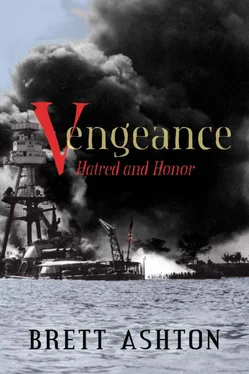As the aircraft continued on, there was no bomb release. “Maybe they hit the pilot?” I thought to myself. But I quickly disregarded that because it still didn’t explain the attack angle.
Then, with no apparent attempt to pull out, or veer away, that airplane crashed straight down into the center of the superstructure of the destroyer and exploded into a huge fireball.
Because I remembered the Japanese sailor who blew himself up on the deck of my ship that very morning, I figured out what they were doing. And when I realized this, had I not been busily engaged in directing my own ship in combat, I would have surely been sick.
“Admiral, something is different,” I said.
The attack had been over for almost two hours. I had consulted the major before deciding to invite the admiral to the bridge to give him the report on my observations of the battle.
“How so?” the admiral responded.
“The attack pattern has changed. Some dive bombers aren’t releasing their bombs. The dive pattern has shifted from a straight run from a high altitude, to a slight dive until they reach a lower altitude and higher speed, followed by a dive which would be too steep to use a bomb effectively.”
“Why couldn’t these just be unskilled pilots?” the admiral asked.
“It’s like they don’t intend to pull out, sir. Usually you can hit a Nip’s plane once or twice with anti-aircraft fire, and they turn away, but some of these are not turning back, even when obviously damaged. And then there are the low level bombers that come in right down almost on the water.”
“What would be the purpose of such an approach?” he asked me, looking a little puzzled.
“That’s just it. They could never release their bombs without getting caught and killed in the blast themselves,” I answered.
“So just what is it you think they’re trying to do?”
“Well, the Japs are a different culture where honor is everything and to lose a fight brings an ultimate dishonor. My marine division officer, an expert in Nip culture, reminded me of the passage from Sun Tzu’s Art of War : ‘On desperate ground, I would proclaim to my soldiers the hopelessness of saving their lives. For it is the soldier’s disposition to offer an obstinate resistance when surrounded, to fight hard when he cannot help himself, and to obey promptly when he has fallen into danger.’”
“What exactly are you saying, Commander Williams?”
“Sir, I think we are winning the war much more than the Japs can face up to. Look at all the territory they had at their peak and where they are now. And with us taking back the Philippines, there seems little hope for them maintaining their empire for much more than a few years.
I continued, “It may seem crazy to you or me, but I think they are deliberately crashing their aircraft into us, because they are fighting as Sun Tzu would say, ‘on desperate ground.’”
“That’s insane!” he said. “What kind of a nut job would do something like that?”
“Is it really, though?” I asked. “Look, sir; if you completely set aside the abhorrent principles of killing yourself like that and look at it from the tactical viewpoint,” I added as he began to look at me like I was one of those “nut jobs.”
“But Commander Williams, all through the war, there have been examples of injured Nips crashing their aircraft into our ships,” the admiral said, apparently still not willing to believe it.
“I understand, sir, but think about it: for the price of two or three planes, bombs, and pilots, they might be getting hits that would sink an aircraft carrier or battleship. Whereas before, we would shoot down twenty or thirty of them, and some of the time, they still wouldn’t even get any hits at all.
“It is an act of desperation, for sure,” I continued. “And the pilots themselves would have to be insane to do it. But I think if that’s what they’re doing, insane or not, they are going to get some very terrifying results from it. Because how do you defend yourself against a man who knows he’s already dead?”
“I see your point, Commander Williams,” the admiral said. “Do you have anything else to report?”
“Just the observation that the enemy has to be very desperate to do something like this, sir. I think we have them on the run in the worst possible way, and from here on out, they are going to fight like cornered rabid dogs.”
And rabid dogs are all that they were in my mind. To me, they were nothing but the most utterly soulless and depraved animals to ever live, and I became frustrated that I could not think of enough to do to eliminate this blight from the face of God’s Earth.
Now, when you are the commanding officer of a ship during wartime, there are your good days, like the flag raising at Iwo Jima; your bad days, like the events following the bombing of the Franklin ; and then there are your outright terrible days. There was a time when the Buffalo experienced several really bad days in a row, which then stretched out to weeks in a row.
During a war, you learn to expect that bad things are going to happen, but you never know just what will happen, when it will happen, or how bad it will be. No matter how prepared you are, it is never quite accurate to say you are ready. When something finally does happen, you suddenly experience the cumulative effects of the decisions you make on a daily basis. After being in command for only a short time, you realize not many decisions are unimportant, so you always have to think them through, try to predict what the outcome of them will be, then hope for the best.
It’s really not that much different than daily life, except if you make the wrong call as the skipper of a Cleveland-class cruiser while the Japanese are shooting at you, almost thirteen hundred people could end up dead in a hurry.
We were out patrolling, mostly for submarines, as part of a destroyer/cruiser task force. The idea at the time was to keep the Japs from threatening the supply lines to the forward bases, of which Iwo Jima was one. We were essentially escorting three destroyers, providing additional air support for them in case of attack while they hunted for submarines.
As the flag ship for the group we had the “fortune” of having an admiral and his staff on board. I never liked being the flagship of a group of ships because sometimes the admirals like to think they are in command of the ship rather than the task force, and that really can get in the way.
If you have ever seen the Pacific Ocean, you would know it is really something to behold. It can get very rough at times, but for some long periods of time, it can become very smooth and peaceful, like glass. It is almost like the ship is floating on a very large mirror where everything in the sky is almost perfectly reflected in the water.
This day was one of the smooth days, the kind you really like because you can see everything coming for miles around the ship. Things like periscopes and torpedo wakes really stand out when the ocean is like that, and in combat, that can really make a huge difference. It couldn’t be counted on to always protect you, but it did tend to relax you a bit.
I was on the bridge with my old friend from the Oklahoma , Chuck Lewis. We were reviewing the procedures for air combat and training, not that I wanted to make any changes; that would be the executive officer’s job. I just always felt as captain, I needed to know what the department heads were thinking and how the crews were trained in case of a crisis, as well as knowing how the ship’s systems operate. That was the kind of thinking that won me the Navy Cross at Pearl.
As well, it is a sign of a good officer to know precisely where his authority ends, and not to step on the authority of those above and below you, as well as not allow them to step on yours. As captain, you do have the trump card of the ship, but you really have to know how and when to use it, or you could end up in big trouble from the admirals in a hurry.
Читать дальше












